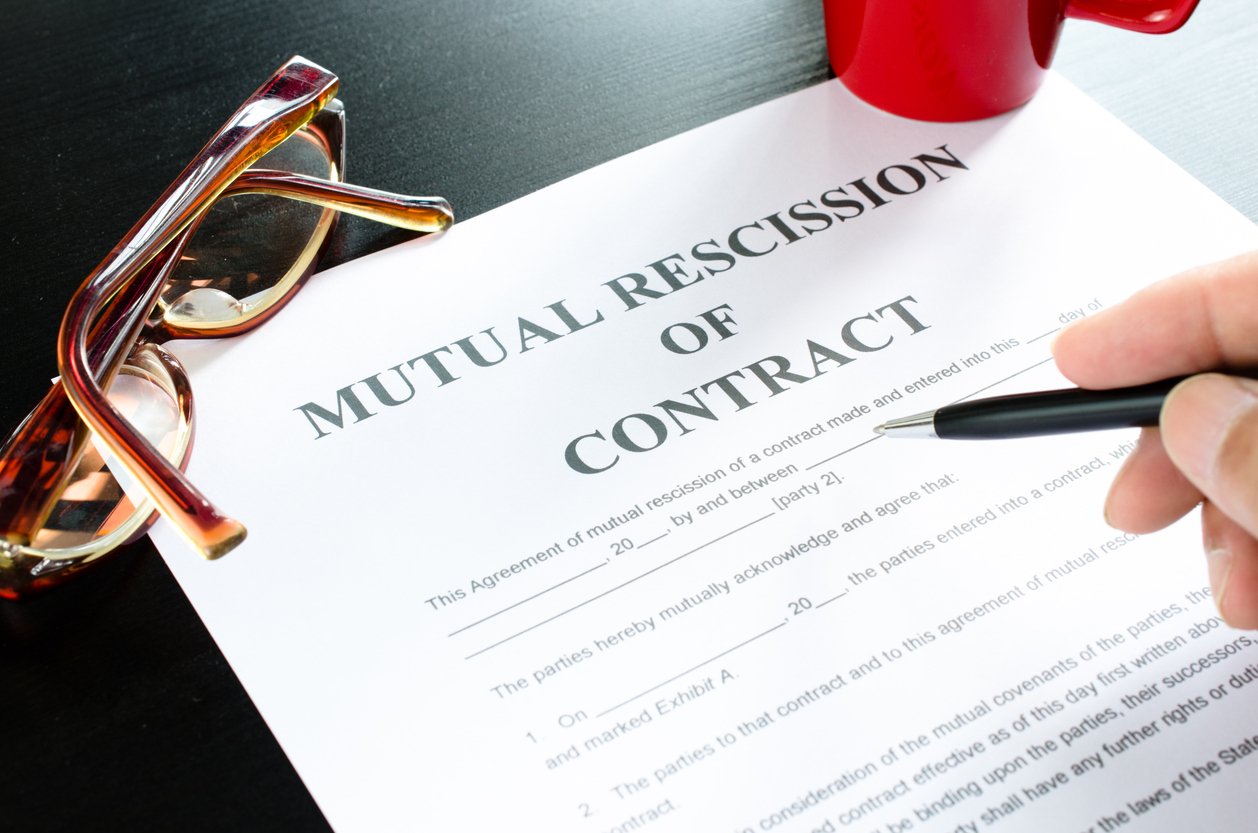In the world of business, contracts form the backbone of most professional relationships. They define the terms, expectations, and responsibilities of the parties involved, providing a structured framework for operations. However, there are situations where these agreements may not go as planned, leading to a need for termination or rescission. But what does rescission of a contract mean? How does it differ from contract termination, and what steps are involved in this legal process?
In this article, we will delve into the intricacies of the contract rescission process, helping you understand when and how it can be applied, and what it means for your business.

Rescission of Contract Meaning
Rescission in contract law refers to the cancellation or nullification of a contract, effectively voiding it from inception as if it never existed. This legal remedy is employed when a contract is fundamentally flawed, thus erasing all contractual obligations as if the agreement was never made. It is different from contract termination, which brings an end to a contract moving forward but acknowledges that the contract was valid until the point of termination.
The Legal Foundation of Rescission
Rescission is rooted in the principle of fairness in contract law. It is designed to protect parties from agreements that were entered into under false pretenses or through unfair means. The law provides this remedy to ensure that no party is unjustly enriched or suffers due to another’s misrepresentation or fraudulent behavior.
Common Grounds for Rescission
Rescission can be sought by any party to a contract when there is a fundamental problem with the agreement. Common grounds include misrepresentation, fraud, undue influence, mistake, or lack of capacity. Each of these grounds addresses a different aspect of unfairness or illegality in the contract formation process, ensuring that parties are not bound by agreements that were not entered into willingly and knowledgeably.
Differences Between Rescission and Termination
Understanding the distinction between rescission and termination is crucial for legal and business clarity. While rescission nullifies a contract from the outset, making it as though the contract never existed, termination acknowledges that the contract was valid up to a certain point and then ceases its future effect. This fundamental difference affects how parties are restored to their pre-contractual positions and what legal remedies they may pursue.
Key Reasons for Rescission
Misrepresentation
Misrepresentation involves a false statement of fact made by one party to another, which induces the latter to enter into a contract. If a party has been misled by these false statements, rescission may be possible. Misrepresentation can be classified as innocent, negligent, or fraudulent, each affecting the rescission process differently. Innocent misrepresentation occurs without intent to deceive, negligent misrepresentation involves a lack of reasonable care in stating facts, and fraudulent misrepresentation is an intentional deception.
Fraud
Fraud occurs when a party is deceived into entering a contract through intentional deceit. This ground for rescission is severe, as it directly attacks the integrity and honesty of the contracting process. Proving fraud requires demonstrating that one party made a false representation knowingly or recklessly with the intent to deceive, and that this representation induced the other party to enter into the contract.
Duress or Undue Influence
Contracts must be entered into freely, without coercion or undue influence. If a party was coerced into signing a contract or if undue influence was exerted, rescission may be warranted. Duress involves threats or pressure to force agreement, while undue influence involves one party taking advantage of their position of power over another to gain contractual advantage. Both scenarios undermine the voluntary nature of contract agreement.
Mistake
A mutual mistake by both parties regarding a fundamental aspect of the contract can lead to rescission. This occurs when both parties have a common but incorrect belief about a vital fact at the time of contract formation. The mistake must pertain to a fundamental aspect of the agreement, not merely a peripheral detail, to justify rescission.
Lack of Capacity
If it is determined that one party lacked the legal ability to enter into a contract, such as due to age or mental competence, rescission could be applicable. Legal capacity ensures that parties understand the contract terms and consequences. Contracts with minors or individuals lacking mental competence are typically voidable, allowing for rescission to protect these parties from exploitation or harm.
The Rescission Process
Rescission is not merely an informal agreement between parties; it often involves a formal legal process. Understanding the steps in this process helps in effectively pursuing rescission.
Step 1: Notification
The first step in the rescission process is for the party seeking rescission to notify the other party of their intention. This notice should clearly state the grounds for rescission and the desire to void the contract. Providing detailed reasons and evidence for rescission helps in setting a clear foundation for the subsequent steps and emphasizes the seriousness of the request.
Step 2: Attempt to Resolve
Before proceeding with legal action, it is often beneficial for parties to attempt to resolve the issue amicably. Negotiation or mediation might lead to a mutually agreeable solution without the need for litigation. These methods can save time and resources, and help maintain professional relationships by fostering communication and understanding. Additionally, alternative dispute resolution mechanisms can provide creative solutions that court decisions might not offer.
Step 3: Legal Action
If negotiation fails, the party seeking rescission may need to initiate legal proceedings. This involves filing a lawsuit in a court with proper jurisdiction. The court will then examine the evidence and determine whether rescission is justified based on the presented facts. Legal representation can be crucial at this stage to ensure that the case is presented effectively and that all relevant legal arguments are made.
Step 4: Court Decision
The court will consider all relevant information, including testimonies, contract terms, and evidence of misrepresentation or fraud. If the court finds in favor of the rescission, it will declare the contract void, and both parties will be returned to their pre-contractual positions as much as possible. The court’s decision is based on a thorough analysis of the evidence and legal principles, ensuring that the outcome is fair and just.
Step 5: Restitution
Following a court’s decision to rescind a contract, the principle of restitution applies. This means that any benefits received under the contract must be returned. Both parties are effectively restored to their original state before the contract was executed. Restitution aims to prevent unjust enrichment and ensure that neither party unfairly benefits from the contract’s voiding. It may involve returning money, goods, or other benefits exchanged under the contract terms.
Rescission Rights and Legal Considerations
Understanding your rights and the legal nuances involved in rescission is critical for business owners and managers facing contract disputes. These rights ensure that you can effectively navigate the rescission process and protect your business interests.
Timeliness
One of the key considerations in rescission is timeliness. Courts typically require that a request for rescission be made promptly upon discovering the grounds for it. Delays can result in a loss of the right to rescind. Prompt action reflects the seriousness of the claim and helps prevent the other party from assuming that the contract will remain in force.
Partial Rescission
In some cases, partial rescission may be an option. This involves nullifying certain parts of a contract while leaving the rest intact. This is only applicable when the rescinded parts do not affect the primary purpose of the contract. Partial rescission can be complex and requires careful legal analysis to ensure that the remaining contract terms are still viable and enforceable.
Defenses Against Rescission
There are defenses available against rescission claims, including affirmation of the contract and laches. Affirmation occurs if the aggrieved party continues to act under the terms of the contract after discovering the issue, indicating acceptance. Laches involves an unreasonable delay in pursuing rescission, potentially barring the claim. Understanding these defenses is crucial for both parties to anticipate potential challenges and strategize accordingly.
Rescission of Contract Examples
Consider a scenario where a small business owner enters into a contract with a supplier based on their claim of exclusive product distribution rights, only to later discover that this was a misrepresentation. The owner may pursue rescission to nullify the contract and seek restitution for any payments made. This example highlights the importance of verifying claims before contract signing and the power of rescission in correcting fraudulent agreements.
In another example, a corporate business manager might find that a contract was signed under duress due to threats from the other party. In this case, the manager can seek legal assistance to rescind the contract and alleviate any obligations imposed by the agreement. This scenario underscores the necessity of ensuring that all contract negotiations are free from coercion and undue pressure.
Conclusion
The rescission of a contract is a powerful legal remedy that can protect businesses from agreements entered into under false pretenses or duress. As a business owner, corporate manager, or employer, understanding the conditions and process of rescission is crucial for safeguarding your interests and ensuring fair business practices. Rescission serves as a vital tool in maintaining the integrity of business transactions and upholding ethical standards.
If you find yourself in a situation where rescission might be necessary, consulting with a legal expert in contract law is advised to navigate the complexities of the process and achieve a favorable outcome. Legal expertise can provide guidance on the best course of action and ensure that your rights are effectively represented in any legal proceedings.
Contact Our Law Firm Today
To speak with a top contract attorney in Los Angeles today, call Law Advocate Group at (310) 651-3065 or fill out the form below so that we may get in touch with you as soon as possible.




